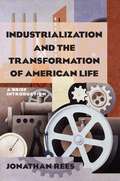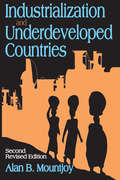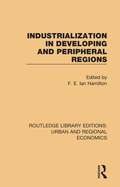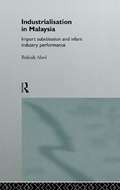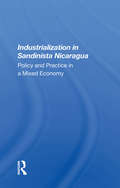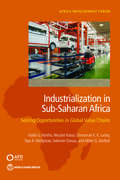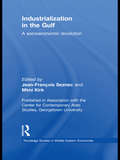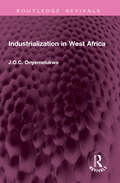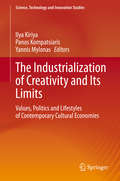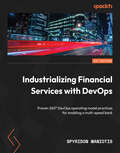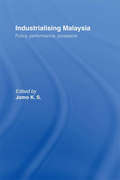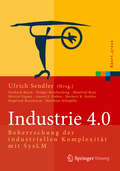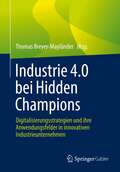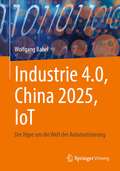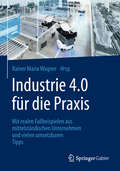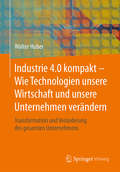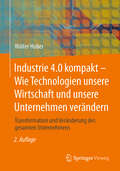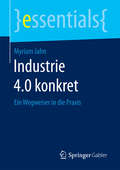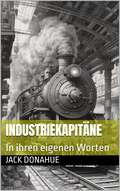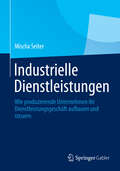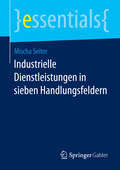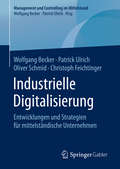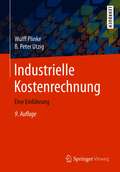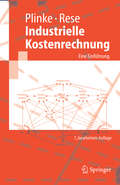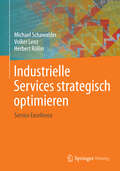- Table View
- List View
Industrialization and the Transformation of American Life: A Brief Introduction
by Jonathan ReesThis book provides a descriptive, episodic yet analytical synthesis of industrialization in America. It integrates analysis of the profound economic and social changes taking place during the period between 1877 and the start of the Great Depression. The text is supported by 30 case studies to illustrate the underlying principles of industrialization that cumulatively convey a comprehensive understanding of the era.
Industrialization and Underdeveloped Countries
by Alan B. MountjoyThe volume of relevant research and literature on this topic is growing but originates mainly from economists, sociologists, and political scientists; geographers have been slow to make contributions. One reason may be that geographers have been preoccupied with differentiation within the geography of production whereas this new field directs attention to the geography of consumption and a study of economies. This book aims to focus attention on the complex and inter-related problems--social, economic, political, and geographical--that come with development, placing particular emphasis on the problems which accompany attempts at industrialization. Focusing on the complex and interrelated social, economic, political, and geographic problems that attend under-development, this book presents one of the first contributions from a geographer on what has been called the most important economic problem of the modern world.Contending that industrialization is no answer for under-developed countries that are striving to maintain expanding populations and to strengthen their economy, Alan B. Mountjoy traces the distribution, causes, and problems of under-development and the difficulties with and possibilities for industrialization as an aid in solving those problems. He defines development and under-development, considers problems of industrialization (including environmental and human problems), discusses the forms industrialization takes, and analyzes the progress of industrialization in specific under-developed areas.The unique geographer's perspective and the ability of the author to select aspects of the study that most clearly reflect the problems of under-developed economies make this work a useful text and reference book for students and scholars of development, economic geography, and international relations.
Industrialization in Developing and Peripheral Regions (Routledge Library Editions: Urban and Regional Economics)
by F.E. Ian HamiltonThe ten years before this book was originally published in 1986 saw major restructuring in the economies of the developed world. This was often closely related to industrial development in newly industrializing and third world countries. This book examines the performance of these developing countries and includes studies of 'peripheral regions' – less developed regions within more advanced economies. The overall findings are that whilst some areas and countries have success stories to tell (such as Korea), many so-called newly industrializing countries and regions have had serious problems.
Industrialization in Malaysia: Import Substitution and Infant Industry Performance (Routledge Studies in the Growth Economies of Asia #Vol. 7)
by Rokiah AlaviSome of the most successful growth economies in the Pacific Rim have combined protectionist Import Substitution Industrialisation policies with export-oriented policies. This study provides a systematic rethinking of relationships between strategies within the Malaysian context.
Industrialization In Sandinista Nicaragua: Policy And Practice In A Mixed Economy
by Andrew ZimbalistThis book explores whether the Sandinista 'mixed economy'—a 'transitional' mixed economy—could have been stable if the Sandinistas had been able to pursue their industrialization strategy for a longer period of time. It explains why Nicaragua's mixed economy was stable for almost eleven years.
Industrialization in Sub-Saharan Africa: Seizing Opportunities in Global Value Chains (Africa Development Forum)
by Kaleb G. Abreha Woubet Kassa Emmanuel K. Lartey Mengistae Albert G. ZeufackIndustrialization drives the sustained growth in jobs and productivity that marks the developmental take-off of most developed economies. Yet, academics and policy makers have questioned the role of manufacturing in development for late industrializers, especially ith more job creation. Industrialization drives the sustained growth in jobs and productivity that marks the developmental take-off of most developed economies. Yet, academics and policy makers have questioned the role of manufacturing in development for late industrializers, especially in view of rapid advancements in technologies and restructuring of international trade.Concurrently, industrialization and structural transformation are integral to the African Union’s Agenda 2063 and the development strategies of several countries in Sub-Saharan Africa (SSA). Given this renewed interest in industrialization across the region, a central question is not whether SSA countries should pursue industrialization as a potential path to sustainable growth but how to promote the prospects of industrialization. Industrialization in Sub-Saharan Africa: Seizing Opportunities in Global Value Chains addresses this question by reassessing the prospects for industrialization in SSA countries through integration into global value chains. It also examines the role of policy in enhancing these prospects. The main findings indicate that • SSA has not experienced premature deindustrialization; the region has witnessed substantial growth in manufacturing jobs despite a lack of improvement in the contribution of manufacturing value-added to GDP. • The region’s integration into manufacturing global value chains is reasonably high but it is dominated by exports of primary products and engagement in low-skill tasks. • Global value chain integration has led to job growth, and backward integration is associated with more job creation. The report emphasizes the role of policy in maintaining a competitive market environment, promoting productivity growth, and investing in skills development and enabling sectors such as infrastructure and finance. Policy makers can strengthen the global value chain linkages by (1) increasing the value-added content of current exports, (2) upgrading into high-skill tasks, and (3) creating comparative advantages in knowledge-intensive industries.
Industrialization in the Gulf: A Socioeconomic Revolution (Routledge Studies in Middle Eastern Economies)
by Jean-François SeznecIn recent years, we have witnessed huge economic and socio-political change in the Gulf. This book examines the rapid industrialization of the region and how local economies are starting to diversify away from petroleum, exploring how this transformative process is starting to impact on the region’s economy and social make-up. With contributions from some of the top scholars and practitioners in the area, this book discusses crucial topics related to the region’s transformation, from issues of economic development and relations with Iran to foreign labour and women’s education and work outside the home. Chapters explore how in addition to the massive growth in investments and products such as oil, gas, chemicals, metals, and cement, this growth has triggered numerous societal changes, such as labour migration, educational reforms, declining natality, and shifting gender roles. Covering in detail a broad range of issues, this book will appeal not only to Middle East experts, particularly those with an interest in the Persian Gulf, but also to development experts and political scientists.
Industrialization in West Africa (Routledge Revivals)
by J O OnyemelukweFirst published in 1984, Industrialization in West Africa is an authoritative text on the industrial development efforts, spatial characteristics and related problems of countries comprising the West African region. The book commences with a detailed description of the political and economic background against which the slow and unsteady pace of industrialization in each country can be appreciated. The analysis outlines the resource potential and historical evolution and structural characteristics of modern manufacturing in the region. The final section assesses the spatial characteristics of West African industrialization, the major problems inhibiting industrial development and frustrating efforts towards economic independence by each country. In conclusion the author considers remedial policy options open to West African countries, both individually and in a common market framework. This book is a valuable source material for all students of social science, geography, economics and regional planning.
The Industrialization of Creativity and Its Limits: Values, Politics and Lifestyles of Contemporary Cultural Economies (Science, Technology and Innovation Studies)
by Ilya Kiriya Panos Kompatsiaris Yannis MylonasCreativity loosely refers to activities in the visual arts, music, design, film and performance that are primarily intended to produce forms of affect and social meaning. Yet, over the last few decades, creativity has also been explicitly mobilized by governments around the world as a ‘resource’ for achieving economic growth. The creative economy discourse emphasizes individuality, innovation, self-fulfillment, career advancement and the idea of leading exciting lives as remedies to social alienation. This book critically assesses that discourse, and explores how political shifts and new theoretical frameworks are affecting the creative economy in various parts of the world at a time when creative industries are becoming increasingly ‘industrialized.’ Further, it highlights how work inequalities, oligopolistic strategies, competitive logics and unsustainable models are inherent weaknesses of the industrial model of creativity. The interdisciplinary contributions presented here address the operationalization of creative practices in a variety of geographical contexts, ranging from the UK, France and Russia, to Greece, Argentina and Italy, and examine issues concerning art biennials, museums, DIY cultures, technologies, creative writing, copyright laws, ideological formations, craft production and creative co-ops.
Industrializing Financial Services with DevOps: Proven 360℃ DevOps operating model practices for enabling a multi-speed bank
by Spyridon ManiotisEmbrace best practices to advance and help evolve your DevOps operating model in the right direction and overcome common challenges that financial services organizations face.Purchase of the print or kindle book includes a free eBook in the PDF format.Key FeaturesDesign the right DevOps operating model for your organization through practical examplesGet insights into a variety of proven practices and concepts that you can employ during your DevOps adoptionGain a holistic view of the complete DevOps capabilities and mechanisms to be enabledBook DescriptionIn recent years, large financial services institutions have been embracing the concept of DevOps in the core of their digital transformation strategies. This book is inspired by real enterprise DevOps adoptions in the financial services industry and provides a comprehensive proven practice guide on how large corporate organizations can evolve their DevOps operating model.The book starts by outlining the fundamentals comprising a complete DevOps operating model. It continues with a zoom in on those fundamentals, combining adoption frameworks with real-life examples. You'll cover the three main themes underpinning the book's approach that include the concepts of 360℃, at relevance, and speeds. You'll explore how a bank's corporate and technology strategy links to its enterprise DevOps evolution. The book also provides a rich array of proven practices on how to design and create a harmonious 360℃ DevOps operating model which should be enabled and adopted at relevance in a multi-speed context. It comes packed with real case studies and examples from the financial services industry that you can adopt in your organization and context.By the end of this book, you will have plenty of inspiration that you can take back to your organization and be able to apply the learning from pitfalls and success stories covered in the book.What you will learnUnderstand how a firm's corporate strategy can be translated to a DevOps enterprise evolutionEnable the pillars of a complete DevOps 360℃ operating modelAdopt DevOps at scale and at relevance in a multi-speed contextImplement proven DevOps practices that large incumbents banks followDiscover core DevOps capabilities that foster the enterprise evolutionSet up DevOps CoEs, platform teams, and SRE teamsWho this book is forThis book is for DevOps practitioners, banking technologists, technology managers, business directors and transformation leads. Prior knowledge of fundamental DevOps terminologies and concepts and some experience practicing DevOps in large organizations will help you make the most out of this book.
Industrializing Malaysia: Policy, Performance, Prospects
by Jomo K. S.Despite growing concern over environmental issues and the sustainability of economic growth, industrialization is still generally associated with progress and development. This is particularly true of developing countries where industrialization is often the nation's top priority. Industrializing Malaysia presents a critical analysis of the experience of industrialization in Malaysia, examining the role, impact and efficacy of post-independence industrialization policies. The author refocuses attention on some major intended as well as unintended implications and consequences of policies and performance. A wide range of issues is covered: in addition to general historical commentaries and sectoral studies, there are analyses of direct foreign investment, technology, linkages, free trade zones, industrial estates, and rural development.
Industrie 4.0: Beherrschung der industriellen Komplexität mit SysLM
by Ulrich SendlerDie nächste Stufe der industriellen Entwicklung, Industrie 4.0, erfordert die Beherrschung multidisziplinärer Entwicklung und Produktion komplexer, intelligenter Systeme. Unsere Industrie ist darauf nicht vorbereitet. Organisation, Prozesse, Management - alles ist ausgerichtet auf Produkte mit nur geringem Softwareanteil. Die Unternehmenslenker müssen ganzheitliche Strategien entwickeln. Eine einfache Verbesserung einzelner Teile des Unternehmens reicht nicht aus. Neben einer allgemeinen Analyse der Situation und der daraus resultierenden Herausforderungen kommen herausragende Vertreter aus Wirtschaft und Wissenschaft zu Wort, die das Thema aus ihrer jeweiligen Sicht beleuchten.
Industrie 4.0 bei Hidden Champions: Digitalisierungsstrategien und ihre Anwendungsfelder in innovativen Industrieunternehmen
by Thomas Breyer-MayländerDieses Buch erläutert die allgemeinen Rahmenbedingungen von Industrie 4.0 und bietet innovativen KMUs im Industriesektor wertvolle Impulse.Industrie 4.0 als Herzstück der digitalen Transformation vieler Produktionsbetriebe liefert ein sehr heterogenes Bild bezüglich der Umsetzung. Die Unterschiede in den organisatorischen Bedingungen liegen im Innovationsgrad der jeweiligen Organisation und lassen sich an der Nachhaltigkeit der Investitionen und dem damit verbundenen mittel- bis langfristigen Markterfolg festmachen. Das Buch zeigt konkrete Umsetzungsbeispiele auf und beschreibt unter anderem Anwendungsszenarien von praxiserfahrenen und innovativen Ingenieur*innen im Maschinenbau und in der Medizintechnik. Zudem vermittelt es einen grundsätzlichen Überblick über Digitalstrategien und Anwendungsfelder von Industrie 4.0. Es richtet sich gleichermaßen an Interessierte, Studierende sowie Praktiker aus den Themenfeldern Technologie, Ingenieurwesen und Management.
Industrie 4.0, China 2025, IoT: Der Hype um die Welt der Automatisierung
by Wolfgang BabelDas Buch beschreibt die Meilensteine der Automatisierung vom Beginn der Ethernet- und der Feldbus-Systementwicklungen sowie die Entstehung des OSI Modells und der Automatisierungspyramide. Es bietet einen Fokus auf die Entwicklung von Feldgeräten und Automatisierungskomponenten im Rahmen der Einflussnahme von Elektronik-, µ-Controller- DSP-, FPGA-, Multi-Core-Prozessoren- und Chip-on-Bond-Entwicklungen sowie Software und Algorithmen.
Industrie 4.0 für die Praxis: Mit realen Fallbeispielen aus mittelständischen Unternehmen und vielen umsetzbaren Tipps
by Rainer Maria WagnerDieser Sammelband führt mittelständische Unternehmen in die komplexe und viel diskutierte Thematik "Industrie 4.0" ein und präsentiert anwendbare, wissenschaftlich fundierte Lösungen für die Praxis. Ausgehend von verschiedenen Forschungsprojekten zeigen die Autoren, wie man sich dem Thema Digitalisierung im Unternehmensalltag strategisch nähert, um daraus individuell zugeschnittene Lösungen zu gewinnen. Erste reale Erfahrungen vier familiengeführter Unternehmen unterschiedlicher Branchen zeigen anhand fünf konkreter Beispiele, welche Herangehensweisen in der Praxis am besten funktionieren. Die Beiträge beleuchten die wichtigsten Bereiche der Industrie 4.0, wie z. B. smarte Logistik und Robotik, Big Data sowie mitarbeiterrelevante Themen wie Aus- und Weiterbildung oder E-Learning. Am Ende jedes Kapitels werden die zentralen Ergebnisse als Praxistipps prägnant zusammengefasst. Das Buch bietet einen hohen Nutzen durch fundierte Informationen und praktische Handlungsempfehlungen auch für Ihr Unternehmen!
Industrie 4.0 kompakt – Wie Technologien unsere Wirtschaft und unsere Unternehmen verändern: Transformation und Veränderung des gesamten Unternehmens
by Walter HuberDas Buch gibt eine kompakte und verständliche Einführung in das Thema Digitalisierung und Industrie 4.0. Es legt den Schwerpunkt auf die Sichtweise des Managements. Manager sind am Ende die Entscheider, aber auch die Treiber für die erforderlichen Veränderungen in Richtung eines digitalen und smarten Unternehmens. Die einzelnen Themen werden entlang der Kernprozesse eines Unternehmens und an Hand praktischer Beispiele verdeutlicht. Hierbei wird ein besonderes Augenmerk auf wirtschaftliche Potentiale und Handlungsempfehlungen für das Management gelegt.
Industrie 4.0 kompakt – Wie Technologien unsere Wirtschaft und unsere Unternehmen verändern: Transformation und Veränderung des gesamten Unternehmens
by Walter HuberDas Buch gibt eine kompakte und verständliche Einführung in das Thema Digitalisierung und Industrie 4.0. Es legt den Schwerpunkt auf die Sichtweise des Managements. Manager sind am Ende die Entscheider, aber auch die Treiber für die erforderlichen Veränderungen in Richtung eines digitalen und smarten Unternehmens. Die einzelnen Themen werden entlang der Kernprozesse eines Unternehmens und an Hand praktischer Beispiele verdeutlicht. Hierbei wird ein besonderes Augenmerk auf wirtschaftliche Potentiale und Handlungsempfehlungen für das Management gelegt.
Industrie 4.0 konkret: Ein Wegweiser in die Praxis (essentials)
by Myriam JahnDieses essential weist Produktions- und Gesch#65533;ftsleitern im Maschinen- und Anlagenbau konkrete Wege zur Digitalisierung und Umsetzung von Industrie 4. 0. Ein anschauliches und detailliertes Praxisbeispiel, das das gesamte Buch durchzieht, zeigt einen der m#65533;glichen Wege in der Supply Chain auf. Um das Beispiel-Produktionsnetzwerk zu digitalisieren, ergibt sich als L#65533;sung und Grundlage eines neuen Gesch#65533;ftsmodells eine vom Smartphone lesbare RFID-Schnittstelle. Die Industrie 4. 0-L#65533;sung besteht aus der gemeinsamen Datenbasis in der Cloud und aus marktlichen Algorithmen, die aus Big Data Smart Data machen. Die nachgewiesene Wirtschaftlichkeit rechtfertigt die Investitionen in Hardware-Entwicklung und Software-Integration. Die Potenziale gehen jedoch weit #65533;ber den im Buch gesteckten Rahmen hinaus.
Industriekapitäne: In ihren eigenen Worten
by Jack DonahueWorte der Weisheit von berühmten Kapitalisten aus der Geschichte Industriekapitäne: in ihren eigenen Worten. Man sagt, dass man, um im Geschäftsleben voranzukommen, bereit sein muss, Köpfe zu riskieren. Man muss aggressiv sein. Man muss einen schicken Anzug und einen tollen Haarschnitt haben. Dieses Buch enthält zehn Essays über die Welt der Wirtschaft, geschrieben von denjenigen, die dazu beigetragen haben, die Welt der Wirtschaft zu dem zu machen, was sie heute ist. Von P. T. Barnum bis Henry Ford und all denen, die dazwischen liegen. Wir grüßen diejenigen, die kamen, eine Nische sahen, die gefüllt werden musste, und sie füllten.
Industrielle Dienstleistungen: Wie produzierende Unternehmen ihr Dienstleistungsgeschäft aufbauen und steuern
by Mischa SeiterIndustrial Services sind der Hoffnungsträger für produzierende Unternehmen, da die Margen für die physischen Produkte aufgrund zunehmender Konkurrenz stark sinken. Neben hohen Margen bieten Industrial Services auch die Möglichkeit der Differenzierung im Wettbewerb, der Erhöhung der Kundennähe und die Verstetigung der Umsätze im Hinblick auf konjunkturelle Schwankungen. Der Aufbau eines Service-Geschäfts ist allerdings keine triviale Aufgabe. Die Bestimmung des Service-Portfolios und die Umstellung der Organisation, um nur zwei Beispiele zu nennen, sind für Unternehmen eine Herausforderung. Gleiches gilt für die Steuerung des aufgebauten Service-Bereichs durch geeignete Management-Ansätze. Unternehmer erhalten mit dem Buch eine konkrete Anleitung, wie ein Service-Geschäft aufgebaut und gesteuert wird. Das Buch ist didaktisch konzipiert und somit auch zum Einsatz in der Lehre geeignet.
Industrielle Dienstleistungen in sieben Handlungsfeldern (essentials)
by Mischa SeiterMischa Seiter stellt im Rahmen von sieben Handlungsfeldern konkrete Probleme und Lösungen vor, so dass produzierende Unternehmen ihr Dienstleistungsgeschäft systematisch gestalten können - beginnend mit der Wahl der Dienstleistungsstrategie, über die Gestaltung der Prozesse und Kapazitäten, bis hin zum Design von Anreizsystemen für sämtliche Mitarbeiter ihres Dienstleistungsgeschäfts. So gesteuert, ist das industrielleDienstleistungsgeschäft für viele Unternehmen eine der zentralen Möglichkeiten, um sich im internationalen Wettbewerb zu behaupten.
Industrielle Digitalisierung: Entwicklungen und Strategien für mittelständische Unternehmen (Management und Controlling im Mittelstand)
by Wolfgang Becker Patrick Ulrich Oliver Schmid Christoph FeichtingerWie kein zweites Thema beschäftigen die Digitalisierung und damit verbundene Konzepte aktuell Politik, Gesellschaft und Wirtschaft. Im deutschsprachigen Raum wird insbesondere Industrie 4.0, die vierte industrielle Revolution, diskutiert. Sie bezieht sich auf die Vernetzung sich selbststeuernder, sensorgestützter Produktionsressourcen und der damit einhergehenden Verschmelzung der physischen und virtuellen Welt zu sogenannten Cyber-Physikalischen Systemen. Das vorliegende Werk behandelt die sich für mittelständische Unternehmen ergebenden Nutzenpotentiale, wie die Steigerung der Produktionsflexibilität, die Verbesserung von Reaktionszeiten, die Optimierung von Monitoring- und Entscheidungsprozessen sowie die Entwicklung innovativer Produkte.
Industrielle Kostenrechnung: Eine Einführung (Springer-lehrbuch Ser.)
by Wulff Plinke B. Peter UtzigDieses Fachbuch bietet eine sichere und systematische Einführung in die Grundlagen der Kostenrechnung. Anschauliche Beispiele verdeutlichen deren Anwendung in der Praxis.Kostenbewusstes Denken und Handeln ist im Zeichen steigender Wettbewerbsintensität eine selbstverständliche Anforderung an alle Führungskräfte, ob sie nun in der Konstruktion, der Produktion oder im Vertrieb tätig sind. Sie müssen beurteilen können, welche Kosteninformationen für Entscheidungen benötigt werden, wie diese Daten zu interpretieren und welche Konsequenzen für das betriebliche Handeln daraus zu ziehen sind. Wer außerhalb aufwändiger Informationssysteme mit einfachen Mitteln seine Kosten nachrechnen möchte, aber auch wer die heutigen ERP-Systeme mit ihren Informationen besser verstehen will, findet in diesem Buch die richtige Methodik und geeignete Beispiele.Eine Einführung in das Product Life Cycle Costing erweitert in dieser Neuauflage die Darstellung des Kostenmanagements. Die Ausführungen zur traditionellen Kosten- und Leistungsrechnung wurden aktualisiert, teilweise neu geordnet und durch ein neues, durchgehendes Fallbeispiel verständlich erklärt.
Industrielle Kostenrechnung
by Mario Rese Wulff PlinkeUm mit einfachen Mitteln Kosten nachrechnen zu können, dafür stellt dieses Buch die richtige Methodik und geeignete Beispiele vor. In diese Neuauflage wurde das Verfahren Prozesskostenrechnung zusätzlich aufgenommen; viele Aufgaben und Beispiele sind neu. Eine sichere Einführung in die Grundlagen der Industriellen Kostenrechnung, die Verfahren werden klar systematisiert, die anschaulichen Beispiele dienen als Leitfaden für die Praxis.
Industrielle Services strategisch optimieren: Service Excellence
by Michael Schawalder Herbert Röllin Volker LenzDieses Buch beschreibt einen neu entwickelten ganzheitlichen Lösungsansatz für das Servicegeschäft in der Industrie, kombiniert mit dem Customer Relationship Management, kurz CRM. Anhand des neu entwickelten Ganzheitlichen Service Geschäftsmodells (GSG-Modell) wird dem Leser ein Weg aufgezeigt, wie das Servicegeschäft von Industrieunternehmen auf einen neuen Level gebracht wird - hin zum Service Excellence. Das Buch erklärt den Weg von den bisher meist transaktionalen Kundenbeziehungen hin zum professionellen Beziehungsmanagement und integriert das CRM ins Servicegeschäft. Aus den theoretischen Themenbereichen CRM und den Leistungssystemen wurde das praxisorientierte GSG-Modell entwickelt. Abschließend wird anhand von 5 Schritten die Umsetzung des Modells hin zum Service Excellence beschrieben.
